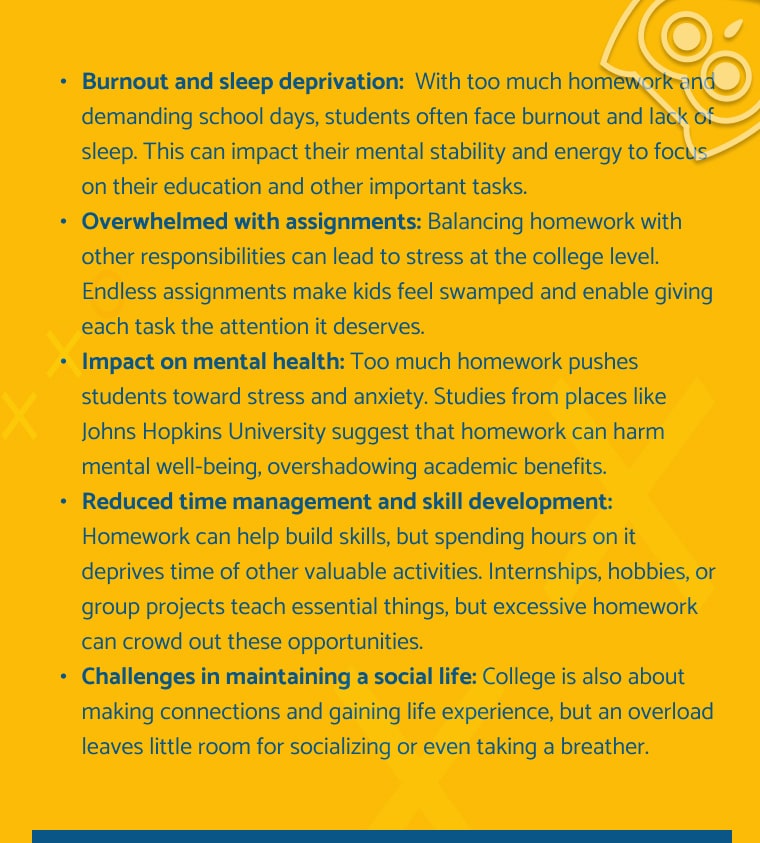Is Homework Beneficial or Harmful?
Table of contents
- 1 Why Do Teachers Give Homework?
- 2 What Does Completing Homework Really Mean?
- 3 How Homework “Nurtures vs. Ruins” Analytical Skills
- 4 Where Did Homework Come From?
- 5 What Does the Academy Say About Homework?
- 6 Homework and Educational Inequality
- 7 How Can Homework Actually Help You Learn Better?
- 8 Can Too Much Homework Do More Harm Than Good?
- 9 How Much Homework Is the Right Amount?
- 10 Are There Better Ways to Learn Than Traditional Homework?
- 11 What Does It All Mean for Students and Teachers?
- 12 References
The debate over should students have homework is more relevant than ever. Wrapping up a home drilling workout can support schooling, boost task prioritization skills, and strengthen critical thinking.
Yet too many home assignments often induce stress, harm mental health, and limit time for rest or non-collegiate endeavors.
Some educators explore why homework should be banned, while others believe it fosters key skills that prepare students for life beyond school.
A heavy home assignment load doesn’t always enhance collegiate acquisition. When assignments are balanced and meaningful, they help students succeed. However, when overdone, home assignments can lead to exhaustion rather than improved student attainment.
If the homework load becomes unmanageable, students often seek professional assistance to do my assignment and reduce stress. It contributes to the child’s education and setting up academic success.
Why Do Teachers Give Homework?
📚 The purpose of home assignments goes beyond just finishing assignments — it’s about building skills that help learners grow academically + personally.
In addition to developing general academic skills, home assignments in psychology courses often require students to apply psychological concepts to research. It fosters a deeper understanding of human behavior.
Teachers assign homework to reinforce the material taught in class. Students must practice independently and gain a deeper understanding of various subjects.
Thus, regularly completing home assignments typically helps retain information more effectively.
“Recent studies show that parental involvement in homework — especially when it emphasizes autonomy support rather than control — is associated with increased homework effort, reduced procrastination, and higher academic achievement among adolescents (Student-perceived parental help with homework, 2023; The Influence of Parental Involvement in Children’s Homework on Academic, 2023).”
Still, we’ve heard a million times how pupils or undergraduates begged someone to “do my homework for me”.
- Why don’t we like home assignments so much?
- Do we really need it if everyone hates it?
- Are there any benefits?
Yes, there are! Especially for college students. Read below to learn about the HW pros.
What Does Completing Homework Really Mean?
As education advanced, so did home assignment. By the 20th century, the focus shifted toward building essential skills.
🧠 Home assignments matured to emphasize time management and critical reasoning — key skills that faculty believed would help students succeed in a didactic scenario.
Today, home assignments continue to evolve, ideally aiming to enhance memory retention and foster self-sufficient learning. Thus, they prepare students for professional settings that value curiosity and adaptability.
How Homework “Nurtures vs. Ruins” Analytical Skills
Is homework necessary? Or is this scholastic workload just extra stress after a long day of classes?
To answer that, it is helpful to examine how home assignments affect the brain.
Research from Johns Hopkins University indicates that balanced home assignments can enhance focus, memory, and independent problem-solving skills (Paschal & Weinstein, 2020; Trautwein & Köller, 2003).
Homework helps to train your brain to recall facts and utilize them later. This skill is essential for high school students, middle school students, and even elementary students, especially those who aspire to attend college someday (Cooper, Robinson, & Patall, 2006).
So, does homework help students learn? In many cases, yes — when teachers focus on well-designed assignments that match each grade level.
Regular practice builds stronger literacy skills, improves understanding, and boosts test scores and results on standardized tests (Baş, 2017; Hattie, 2009).
Students typically retain more information when they review it at home in short sessions. Even fourth-grade students can develop lasting study habits through short, focused take-home assignments (OECD, 2019).
When Homework Backfires and Harms Learning
Too many home assignments can have the opposite effect. Long nights lead to sleep deprivation, family stress, and even physical health problems (Galloway, Conner, & Pope, 2013).
Students who spend hours on schoolwork often experience learning difficulties and lose motivation (Pope, 2014).
Research from Challenge Success found that high school boys and struggling students with after-school jobs are especially prone to fatigue and mental exhaustion (Conner, Galloway, & Pope, 2015).
When parents work multiple jobs, helping with tricky assignments becomes hard, which adds more stress for young learners at home (OECD, 2021).
Cognitive Overload and Long-Term Damage
Cognitive overload is real. When teachers assign more than the brain can handle, students stop learning efficiently. Over time, this can weaken children’s academic strengths and slow educational progress (Sweller, 2011).
Experts in family therapy also note that too much pressure from assigning homework can strain parent-child relationships (Epstein & Van Voorhis, 2012).
Why Balanced Homework Matters
Modern educators suggest finding a balance instead of eliminating homework entirely. A strong homework policy should focus on short, meaningful exercises that build life skills, not just repetition (Eren & Henderson, 2011).
These primary source-based projects or reflection tasks support deeper learning and help students think critically. When a home assignment is clear, practical, and linked to lessons, it becomes a tool for growth rather than a source of stress.
Is Homework Effective After All?
So, is homework effective? The justification depends on how it’s used.
Balanced, well-designed assignments sharpen focus, improve memory, and help students think independently. However, when overburdened, home assignments can hinder learning, harm mental health, and diminish the joy of discovery.
To learn more about how it all began, check out who invented homework and why — it’s a surprising story of discipline, curiosity, and changing education.
Where Did Homework Come From?
Home assignments have their roots stretching back to the 19th century, when they were first introduced to keep students focused and disciplined beyond the classroom. In those early days, home assignment was primarily aimed at mindless reiteration.
Undergraduates were assigned tasks to cram facts and reinforce lessons drilled in class. The purpose was clear: discipline, discipline, discipline.
What Does the Academy Say About Homework?
If you look up the reasons why homework is bad, you’ll find plenty of debate.
The modern homework debate isn’t simple — research shows that while homework is good in some situations, it can also backfire when students face too much homework or poorly designed assignments.
What Research Says About Homework Benefits
A major meta-analysis by Harris Cooper and colleagues (2006) reviewed over 60 studies and found that homework improves student achievement, primarily for older learners.
For high school students, completing home assignments was linked to moderate gains in test scores and overall academic achievement. However, for elementary school and younger students, the effect was minimal (Cooper, Robinson, & Patall, 2006).
In short, the benefit depends on the grade level and the amount of homework students receive.
Why Meaningful Homework Works Better
A more recent study published in Issues in Educational Research also found that homework improves academic performance when assignments are meaningful and connected to classroom learning (Baş, 2017).
Well-designed homework activities that encourage critical thinking and time management skills help students retain knowledge more effectively. Yet, busy work or repetitive drills offer little benefit and can reduce student motivation.
When Homework Becomes Harmful
Not all studies show positive effects. Research from Stanford University revealed that excessive homework can lead to serious problems.
Students in high-performing schools who spent more than three hours per night on home assignments reported higher levels of stress, sleep deprivation, and mental health issues, along with reduced time for extracurricular activities and family (Galloway, Conner, & Pope, 2013; Pope, 2014).
This suggests that excessive homework may harm well-being, even if it temporarily improves grades.
Official Recommendations for Healthy Homework
Education organizations also recognize this.
The National Parent Teacher Association and the National Education Association recommend the “10-minute rule” — about ten minutes of home assignment per grade level per night.
They emphasize that teachers involve parents in realistic expectations and focus on quality rather than quantity (National PTA, 2015; NEA, 2019).
When Homework Truly Works
Overall, homework leads to the best outcomes when it reinforces classroom lessons, builds key skills, and respects students’ balance.
However, when the workload exceeds a healthy limit, it becomes clear that homework doesn’t help students learn, and it can also harm their mental health and long-term academic success.
Homework and Educational Inequality
Home assignments can help students learn, but not every student gets the same chance to benefit from them.
Numerous studies on homework have shown that family income, access to resources, and parental support significantly influence the effectiveness of homework in helping students (Eren & Henderson, 2011).
This creates what educators refer to as the “homework gap.”
How Family Resources Shape Homework Success
Students from higher-income families often have access to quiet spaces, reliable internet, and parents who can provide support for their children’s learning. But children from low-income homes may face different realities.
Their parents may work long hours or night shifts, leaving little time to help with assignments. Some homes lack stable internet connections or even basic supplies. Without these tools, students complete fewer assignments and fall behind on standardized tests and class projects (OECD, 2021).
Why Inequality Starts Early
The problem begins early.
For example, elementary school homework often depends on parents helping young kids with reading or math. When families lack time or resources, elementary school learners struggle to keep up.
As a result, students typically retain less knowledge and may develop learning difficulties that carry into higher grades.
Barriers Older Students Face
Older students face new barriers. Sixth-grade and high school learners from low-income backgrounds may balance home assignments with part-time jobs or family duties.
These pressures can lead them to believe that eliminating homework would reduce stress, but research suggests that a well-designed homework policy and flexible schedules are more effective. Supportive programs, such as after-school tutoring or homework clubs, provide equal opportunities for all students to succeed.
How Fair Homework Builds Skills
Despite these challenges, there are clear pros of homework when done right. Home assignments can foster independent problem-solving skills, strengthen children’s academic strengths, and prepare students for advanced academics later in life (Trautwein & Köller, 2003).
When homework helps, it teaches responsibility and focus — key traits that students need throughout the school year and beyond.
What Schools and Parents Can Do
Educators and parents play a key role. Teachers should provide primary source materials, step-by-step guides, and online support to help close the achievement gap. Schools can also adapt lessons based on information teachers gather about home situations.
When schools focus on fairness instead of punishment, children’s learning improves across all backgrounds.
Why Fair Homework Design Matters
The latest research in social science, as well as the International Journal of Education Research, agrees: equality in home assignment design leads to better outcomes for everyone (Paschal & Weinstein, 2020).
By rethinking how and why assignments are given, schools can make sure that homework builds knowledge — not barriers.
So, what are the benefits of homework when it’s fair? It helps every student grow — not just those with extra support at home. A balanced approach ensures that all learners, regardless of their background, have equal opportunities to learn, succeed, and excel.
How Can Homework Actually Help You Learn Better?
Homework has some solid benefits for college students, even if it sometimes feels like a chore. Here’s how it can make a difference:
- Skill Building. Homework assignments develop essential skills, including time management, focus, and problem-solving. These are must-haves in college and beyond.
- Deeper Learning. Tackling homework independently allows kids to explore class topics in-depth, reinforcing what they learn in the classroom.
- Goal Setting. Students develop routines and set goals, which are essential for maintaining their studies and other commitments.
- Better Grades. Regular practice and review can help improve grades, enabling students to stay on track academically.
- Growth Mindset. Homework builds resilience, encouraging students to view challenges as opportunities for growth — something many parents value.
Can Too Much Homework Do More Harm Than Good?
Any positive aspect has its opposite features. Home assignments are no exception.
While home assignments can be helpful, they also have their downsides, especially for college students who are juggling classes, work, and social lives.
Trautwein and Köller (2003) also emphasize that homework only supports learning when the tasks are clear and well-designed; excessive or confusing assignments weaken engagement and motivation.
Here’s a look at some of the main drawbacks:

Even parents and teachers recognize that too much homework can detract from learning. The key is finding a balance that prepares students for higher education and beyond without overwhelming them.
How? We are here to tell you!
How Much Homework Is the Right Amount?
Getting the right balance of homework is like finding the perfect recipe ─ it’s all about quality over quantity.
The right amount of homework can make a huge difference in students’ learning without overwhelming them.
For many teachers, it’s not about assigning hours of home assignments but about creating tasks that impact student academic achievement.
What Makes Homework Worth Doing?
Instead of a pile of repetitive tasks, homework should be purposeful and meaningful. Activities that challenge students to use their time management skills or develop problem-solving abilities are key.
Can Homework Be Personalized for Different Students?
Not all students are the same, so the “one-size-fits-all” homework model doesn’t work.
Some individuals may benefit from short tasks that help build time management skills, while others may need assignments that allow them to delve deeper into a subject.
For instance, for high school and low-income children, flexibility in assignments can provide the support they need without adding extra pressure.
When’s the Best Time to Do Homework?
The timing of home assignments also matters. Assignments should fit within the school day schedule without forcing students into late-night study sessions, which can lead to burnout.
Short, effective tasks are often more powerful than long questions. Similarly, homework that takes less time but requires real engagement can make learning feel more meaningful.
With the right approach, homework isn’t just a checklist but a tool that prepares students for life beyond high school, building skills they’ll carry into higher education and their careers.
The best home assignments lead students to grow academically and personally without overloading their schedules.
Are There Better Ways to Learn Than Traditional Homework?
As education evolves, so does the approach to homework. For many students, especially at the high school level, traditional homework assignments can feel like a chore rather than a tool for growth.
So, what if there were alternatives that still helped students learn, build time management skills, and even involve parents more meaningfully?
Let’s look at fresh approaches beyond the usual worksheet routine.
Project-Based Learning
Instead of nightly assignments, exploring good process essay topics allows students to delve into various aspects of a subject in-depth. This approach helps develop problem-solving skills and engages students in real-world applications, making their learning feel relevant.
Flipped Classroom Activities
With flipped classroom models, students watch lessons at home and then apply the concepts during class time. This method transforms “home assignments” into an opportunity for students to prepare before a lesson, giving them more time to explore topics alongside their peers and with the support of their teacher.
Skill-Building Exercises
Instead of lengthy assignments, skill-building exercises offer quick, focused activities to improve specific abilities.
For example, a 10-minute critical thinking exercise might be enough to help students practice problem-solving skills. These short tasks also consider the student’s well-being, helping to avoid the health problems associated with excessive homework loads.
Cross-Curricular Projects
Another alternative is cross-curricular home assignments that involve other subjects. Imagine an assignment that combines science, history, and art.
This allows students to connect concepts across the curriculum and creatively apply their learning. It’s a holistic approach that encourages a range of skills, from research to artistic expression.
Cross-curricular projects might combine physics with environmental science, allowing students to apply their learning to real-world science research topics creatively
Mindfulness and Well-being Tasks
Learning can also mean taking a step back and prioritizing mental health in today’s fast-paced world. Mindfulness exercises, journaling, or even time spent on hobbies can help students recharge while also serving as an educational activity.
These activities promote balance, assisting students to manage stress and build resilience, thereby preparing them for the demands of school and beyond.
What Does It All Mean for Students and Teachers?
So, is homework beneficial to students? The answer depends on how it’s designed and how much is assigned.
Research indicates that homework is effective when it supports classroom learning, fosters strong study habits, and develops time management skills. Moderate assignments improve memory, focus, and independence — all key homework benefits confirmed by major studies in education.
However, excessive homework can lead to stress, fatigue, and a decrease in motivation.
The benefits of homework research also indicate that excessive workloads can harm well-being and may not always lead to improved achievement scores. According to national assessment data, balanced and meaningful home assignments lead to better long-term results than repetitive drills.
Instead of eliminating homework, educators should focus on making it purposeful and fair.
When homework is beneficial, it encourages critical thinking, enhances understanding, and helps students apply lessons to real-life situations. The goal is not to increase assignments, but rather to have smarter ones that respect balance and inspire curiosity.
When done right, home assignments become a bridge between school and lifelong learning — not just another task to finish!
Сheck my paper

References
- Baş, G. (2017). Homework and academic achievement: A meta-analytic review. Issues in Educational Research, 27(1), 31–50.
- Conner, J., Galloway, M., & Pope, D. (2015). Success with less: Lessons from teachers who reduce homework. Phi Delta Kappan, 96(6), 8–13.
- Cooper, H., Robinson, J. C., & Patall, E. A. (2006). Does homework improve academic achievement? A synthesis of research, 1987–2003. Review of Educational Research, 76(1), 1–62.
- Eren, O., & Henderson, D. J. (2011). Are we wasting our children’s time by giving them more homework? Economics of Education Review, 30(5), 950–961.
- Epstein, J. L., & Van Voorhis, F. L. (2012). More than minutes: Teachers’ roles in designing homework. Educational Psychologist, 47(3), 155–173.
- Galloway, M., Conner, J., & Pope, D. (2013). Nonacademic effects of homework in privileged, high-performing high schools. Journal of Experimental Education, 81(4), 490–510.
- Hattie, J. (2009). Visible Learning: A Synthesis of Over 800 Meta-Analyses Relating to Achievement. Routledge.
- National Education Association. (2019). Research Spotlight on Homework.
- National Parent Teacher Association. (2015). PTA Resolution on Homework: Quality Over Quantity.
- OECD. (2019). PISA 2018 Results (Volume I): What Students Know and Can Do. OECD Publishing.
- OECD. (2021). Education at a Glance 2021: OECD Indicators. OECD Publishing.
- Paschal, R. A., & Weinstein, T. (2020). Homework and learning outcomes: Revisiting the debate. International Journal of Education Research, 99, 101–117.
- Pope, D. (2014). Stanford research shows pitfalls of too much homework. Stanford Graduate School of Education.
- Sweller, J. (2011). Cognitive load theory. Psychology of Learning and Motivation, 55, 37–76.
- Trautwein, U., & Köller, O. (2003). The relationship between homework and achievement—Still much of a mystery. Educational Psychology Review, 15(2), 115–145.







